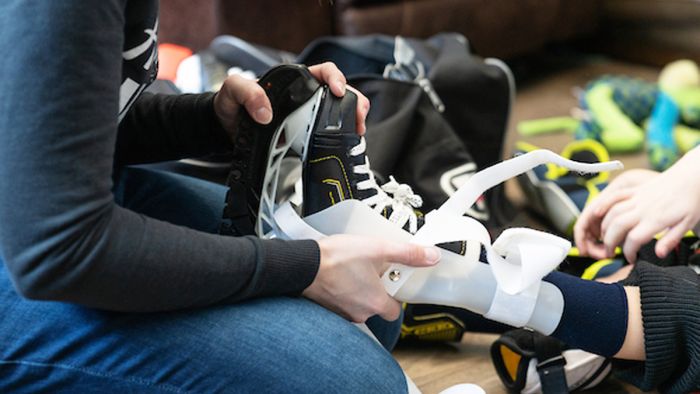Being a kid comes with a fair share of injuries. From running around the playground to playing sports and more, enduring bumps and bruises is an expected part of childhood and the teenage years.
But how can you tell when those routine, seemingly minor injuries may be an indicator of something more serious?
Anterior cruciate ligament (ACL) tears are among the most common knee injuries in adults, and can sometimes occur during childhood and adolescence. ACL tears in kids may seem unlikely, but it’s never out of the realm of possibility when dealing with sports and active kids.
Depending on age, children tend to fracture before tearing their ACL. However, ACL injuries can and do happen in kids when excessive pressure is put on the knee joint, resulting in a torn ligament.
Keep reading to learn more about ACL tears in kids, including ACL tear symptoms, recovery time, surgery and much more, and get to know what makes sports medicine at Gillette Children’s different.
What causes ACL tears in children and teens?
Your child’s ACL can be injured or torn in a variety of ways, with some of the most common being a sudden pivoting or cutting move during sports. This is commonly seen in soccer, football, and basketball players.
When an individual tears their ACL, they’ll sometimes say their knee “gave out” or “popped.” In the short term, this can make it difficult for your child to play their favorite sports. In the long term, this injury can cause damage to other areas in the knee, which can potentially lead to arthritis down the line.
Sudden impact to the outside of your child’s knee and sudden changes in direction can lead to a stretch and tear of the ACL. As stated earlier, this is because too much strain is being placed on their knee joint from quick stops or short pivots, leading to the injury.
Some other common causes may include:
- Suddenly stopping or slowing down while running.
- Quickly changing directions while running.
- Jumping and landing incorrectly.
- Overusing the leg in a repetitive activity, like jumping, running, twisting, or pivoting.
What are the symptoms of an ACL tear in kids and teens?
When your child experiences the injury, they’ll typically feel a “snap” or “pop.” The amount of pain experienced at the time of injury can vary from child to child, but the pain has the potential to be severe in most cases.
Once your child gets hurt, they’ll feel noticeable instability in their knee. They’ll be unable to continue playing and they’ll likely notice immediate swelling of their knee. The amount of swelling can potentially be decreased if the knee is immediately splinted or iced.
When should my child see a doctor for an ACL tear?
If you notice any of the following warning signs of an ACL tear, contact your child’s doctor immediately to discuss the situation and potentially schedule an appointment.
- Increased or severe pain
- Their leg or foot is cool, pale, or changes color.
- They can’t stand or put weight on the knee.
- Their knee looks twisted or bent out of shape.
- They can’t move the knee.
- They’re showing signs of infection, including increased pain, a fever, swelling, warmth, or redness on or behind the knee.
How is an ACL tear treated in children and teens?
If the overall stability of your child’s knee is intact, the surgeon may recommend nonsurgical treatment. While nonsurgical routes, like a knee brace or physical therapy, can be used, it’s generally not the preferred treatment option for younger individuals.
Why? Because young people who decide not to undergo surgical reconstruction typically experience continued knee issues and long-term knee problems.
In general, doctors tend to recommend knee surgery to make a new ACL out of another one of your child’s tendons. In the end, the goal of an ACL surgery is to return your child’s knee to normal function and stability. During the operation, an orthopedic surgeon will actually create a new ligament from your child’s own tissue to reconstruct their ACL and get them back to normal activities down the line.
ACL Tear Recovery Time
In many cases, to complete your child’s ACL rehabilitation thoroughly and safely, experts in the field typically use a 9- to 12-month average time frame for returning to normal athletic activity.
However, keep in mind that this process and timing can vary for each child. That’s why it's important to speak with your child’s treatment team regularly to discuss your child’s progress, pain levels, and the timeline for achieving physical goals.
What are the risk factors and complications for an ACL tear?
While anyone can potentially injure their ACL, there are certain factors that can put your child at a higher risk:
- Being female, since the rate of ACL injuries is substantially higher in female athletes than in males.
- Participation in certain sports, including basketball, soccer, football, volleyball, downhill skiing, lacrosse and tennis.
- Having a previously torn ACL or having weak core muscles.
In addition, complications associated with an ACL tear can include:
- Continued knee pain.
- Stiffness or weakness of the knee, which limits movement.
- Improper healing, which can make the problem worse.
- Limping and reduced ability to move.
- Developing other conditions, like osteoarthritis.
- Bleeding and blood clots.
Count on Gillette Children's for Your Child's Sports Injury
Gillette Children’s sports medicine providers are orthopedic experts who’ve chosen to specialize in the unique needs of children and teens experiencing complex conditions and injuries. We want to make it easy for families like yours to find trusted care quickly when health issues arise.
We are committed to helping your child recover from their injury and get them back to their favorite physical activities as quickly as possible. To schedule an appointment, call our Acute Orthopedic Clinic at 651-290-8707 today.
 Home Page
Home Page

